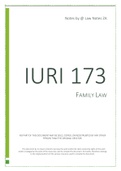Notes by @ Law Notes ZA
IURI 173
FAMILY LAW
NO PART OF THIS DOCUMENT MAY BE SOLD, COPIED, OR REDISTRUBTED BY ANY OTHER
PERSON THAN THE ORIGINAL CREATOR.
This document by no means intend to (a) copy the work and/or (b) claim ownership rights of the work
and/or (c) plagiarise the work of the resources used to compile this document. All credits, therefore, belongs
to the original authors of the various resources used to compile this document.
, LAW NOTES ZA
notes available for 2023
o IURI 173 Notes Include:
• Comprehensive summary of
textbook work
o IURI 174
• Work covered in PowerPoints
• Work covered in class
PLUS
• Vocabulary list for each study
o IURI 211 unit
PLUS
• Case law summaries
o IURI 213 (depending on module)
o IURI 273
1
📩 lawnotesza@outlook.com
*notes for each study unit may be bought separately
, STUDY UNIT 1 - INTRODUCTION
OVERVIEW OF FAMILY LAW IN SA:
• SA family law only recognises civil marriages, civil unions, customary marriages
• Laws regarding the parent and child include parental responsibilities and rights of the
parents, but also those of extended family and third parties
• It is important to study family law as family relationships are part of our everyday life
for all individuals
• This area of law can be challenging due to the personal and emotional nature of
relationships and in addition to law, customs and morals guide these relationships
WHAT IS FAMILY LAW
• Family law is concerned with the law or rules relating to families in South Africa
Definition
• Regulates the origin, contents, and dissolution of all legal relationships between
spouses and life partners / domestic partnerships, and parents and children
• Family law falls under private law, but it is not an independent branch of law
o There are 3 main branches it overlaps with
o Falls under private law because it is between individuals
BRANCHES OF FAMILY LAW
• Private law
o Deals with legal relationship between private legal subjects
o E.g. family law, contract law
• Public law
o Deals with legal relationship between the state and the legal subject
o E.g. criminal law
• Corporate law
o Deals with commercial issues
o E.g. trust law
Example of interaction between family law and other branches:
• Public Law: A criminal prosecution may follow where a spouse fails to
comply with a maintenance order
• Law of Persons
• Law of Property
• Law of Contract + Law of Delict
2
, THE HISTORY AND DEVELOPMENT OF FAMILY LAW
• Family unit was always traditionally based on marriage as society has given marriage a
central position in the law where it receives special protection
o Common law described the typical nuclear family as consisting of:
§ married couple + biological children
o This led to the recognition of monogamous marriages only
§ Other forms not recognised: E.g. same sex, customary
• Post 1994
o Substantial changes occurred since the constitution dispensation
§ the law now makes provisions and recognises a variety of families
• The only law that can be said to discriminate men is the children born out of wedlock
SOURCES OF FAMILY LAW
• Constitution of South Africa, 1996 (most important source, supreme law of SA)
• Statutory Law (legislation: legislative arm of government – E.g. Marriages Act, 1961)
• Case Law (court judgements: judicial arm of government)
• Common Law (Roman-Dutch law)
• Customary Law (African custom)
• International Law (treaties, conventions etc. such as International Convention on the
Rights of the Child)
• Religious Law (Tenets of Islam, Hinduism, Judaism)
IMPACT OF THE CONSTITUTION ON FAMILY LAW
Section of the Constitution
o section 1 = Values, equality, Human Rights freedoms etc.
o section 2 = Supremacy – any law/conduct inconsistent with constitution is
invalid
o section 9 = Equality – no unfair discrimination based on race, gender, sex,
pregnancy, marital status, ethnic or social origin, colour, sexual orientation,
age, disability, religion, conscience, belief, culture, language, birth
o sex = biological / gender = what you identify as
o section 10 = Human dignity
o section 15 = Freedom of religion, belief, opinion
o section 28 = Children’s rights
3




